The Intel Skylake i7-6700K Overclocking Performance Mini-Test to 4.8 GHz
by Ian Cutress on August 28, 2015 2:30 PM ESTCPU Tests on Windows: Professional
Cinebench R15
Cinebench is a benchmark based around Cinema 4D, and is fairly well known among enthusiasts for stressing the CPU for a provided workload. Results are given as a score, where higher is better.
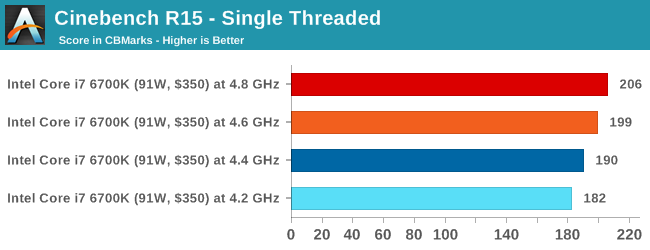
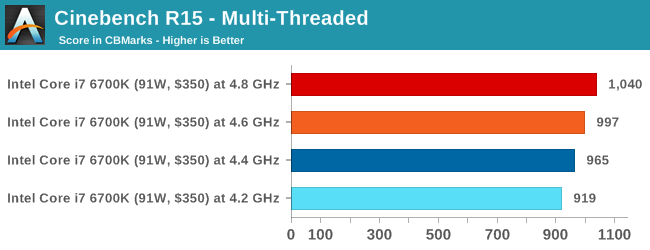
Agisoft Photoscan – 2D to 3D Image Manipulation: link
Agisoft Photoscan creates 3D models from 2D images, a process which is very computationally expensive. The algorithm is split into four distinct phases, and different phases of the model reconstruction require either fast memory, fast IPC, more cores, or even OpenCL compute devices to hand. Agisoft supplied us with a special version of the software to script the process, where we take 50 images of a stately home and convert it into a medium quality model. This benchmark typically takes around 15-20 minutes on a high end PC on the CPU alone, with GPUs reducing the time.
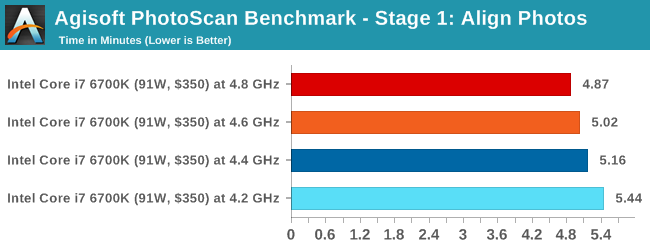
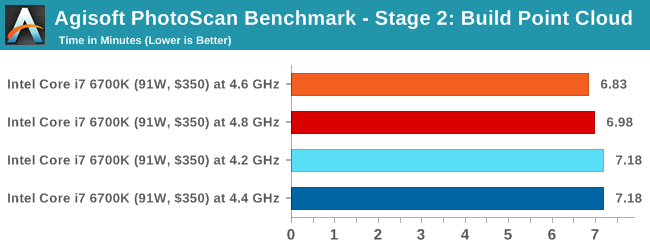
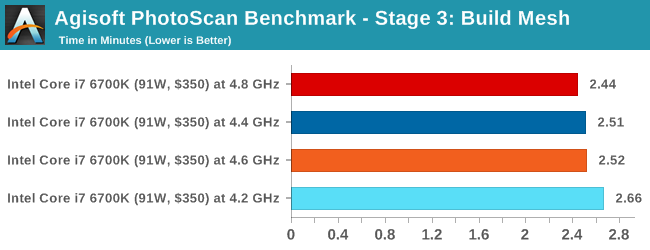
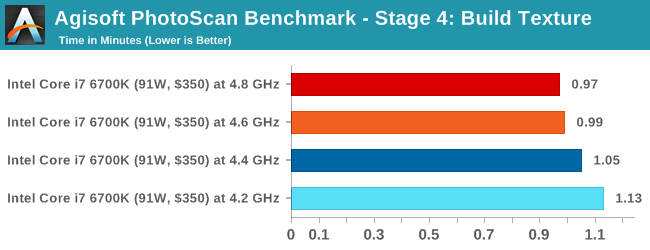
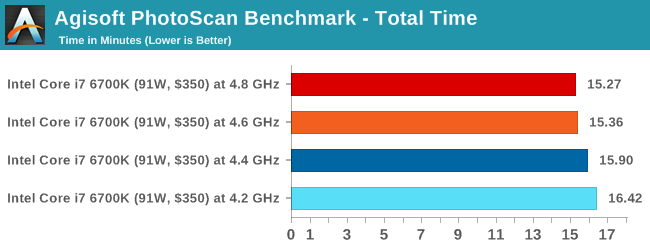
Rendering – PovRay 3.7: link
The Persistence of Vision RayTracer, or PovRay, is a freeware package for as the name suggests, ray tracing. It is a pure renderer, rather than modeling software, but the latest beta version contains a handy benchmark for stressing all processing threads on a platform. We have been using this test in motherboard reviews to test memory stability at various CPU speeds to good effect – if it passes the test, the IMC in the CPU is stable for a given CPU speed. As a CPU test, it runs for approximately 2-3 minutes on high end platforms.
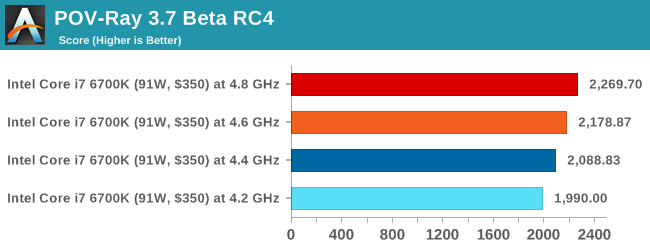
HandBrake v0.9.9 LQ: link
For HandBrake, we take a 2h20 640x266 DVD rip and convert it to the x264 format in an MP4 container. Results are given in terms of the frames per second processed, and HandBrake uses as many threads as possible.
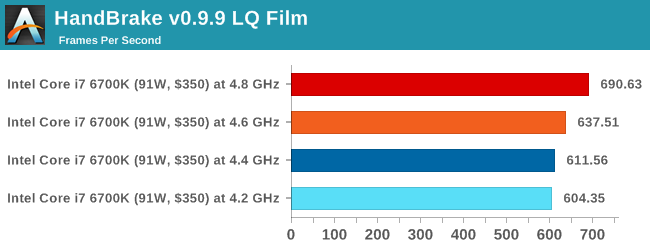
Conclusions on Professional Performance
In all of our professional level tests, the gain from the overclock is pretty much as expected. Photoscan sometimes offers a differing perspective, but this is partly due to some of the randomness of the implementation code between runs but also it affords a variable thread load depending on which stage. Not published here are the HandBrake results running at high quality (double 4K), because it actually failed at 4.6 GHz and above. There is a separate page addressing this stability issue at the end of this mini-review.










103 Comments
View All Comments
Impulses - Saturday, August 29, 2015 - link
Why would it make a difference? The BCLK is now decoupled from anything that would matter... It's just another tool like the ratio, one that could let you eke out an extra 50MHz or whatever if you really care to take it to the edge.Khato - Friday, August 28, 2015 - link
Two inquiries regarding future Skylake testing:1. While the initial review was intriguing in terms of actually exploring the DDR3L vs DDR4 2133 performance difference, higher DDR4 frequency testing is still absent. Will there be a memory scaling article at some point?
2. What's the point of evening including the discrete gaming benchmarks? Is there a plan to revamp this category of testing to provide meaningful data - inclusion of minimum frame rates, exploring different settings, using different games.
ImSpartacus - Saturday, August 29, 2015 - link
Yeah, it would be nice if we could get some proper frame time benchmarking.varg14 - Saturday, September 5, 2015 - link
I too would love to see High end DDR3L compared to DDR4 on skylake and if the tight timings of DDR3l are beneficial in what areas if at all.ImSpartacus - Friday, August 28, 2015 - link
I feel ridiculously shallow for asking this but could we see fewer tables that look straight out of excel going forward?Anandtech has a glassy table & graph design language. While it might be a bunch of excel templates, it still lets me suspend my disbelief a little bit more.
I can't justify my request with any tangible argument other than something "feels" off. I apologize as I understand how frustrating such feedback can be. I trust Anandtech to always be improving & setting the standard on all fronts.
ImSpartacus - Friday, August 28, 2015 - link
classy*garbagedisposal - Saturday, August 29, 2015 - link
They've used the same format a number of times before and it's pretty damn clear and easy to understand. Prettifying the excel tables on a mini article is a waste of time.ImSpartacus - Saturday, August 29, 2015 - link
You're right, this isn't an isolated issue. I didn't comment on it first time or the second time.And it's hard to tell someone who exhaustively tested numerous scenarios that they oughta spend even more time to ensure that they follow style guides and that the extra time spent won't even affect the utilitarian value of the results.
V900 - Friday, August 28, 2015 - link
Nice overview.But isn't overclocking in reality not really relevant anymore? A remnant of days gone by?
Dont get me wrong, I was an eager overclocker myself back in the day. But back then, you could make a 2-300$ part perform like a CPU that cost twice as much, if not more.
Today, processors have gotten so fast, that even the cheap 200$ CPUs are "fast enough" for most tasks.
And when you do overclock a 4ghz CPU by 600mhz or more, is the 5-10% speed increase really worth it? Most people would have been better off taking the hundreds of dollars they invested in coolers, OC friendly motherboards, etc and put them towards a better CPU instead.
Impulses - Friday, August 28, 2015 - link
There's a lot of people that just do it for fun, same way people mess with their cars for often negligible gains... Not all spend a lot on it either, I'd buy the same $130-170 mobo whether I was OC'ing or not, and I'd run the same $65 cooler for the sake of noise levels (vs something like a $30 212).